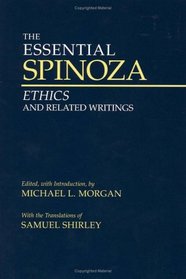I did not and will not finish this book. Sorry.
Baruch Spinoza - an important philosopher - lived between 1632 and 1677. This book is a translation of at least some of his major works.
I've read or heard tidbits about Spinoza over the years and thought he sounded interesting. I should have read the Wikipedia page on him rather than tackle this muck head on, however.
I have come to the belated conclusion that reading philosophy is just not for me. In too many cases I catch the authors playing word games. In the worst example I know of - in Being and Time - Martin Heidegger used a word to mean one thing when it was capitalized and something else when it wasn't. I went nuts trying to figure out what he was babbling about.
Much more common is simply creating a new definition for a word, one that has nothing to do with normal usage. Spinoza (or his editor) plays that game here, and I find it idiotic.
Worse, though, is an apparently rigorous approach to things, reminiscent of mathematics. At the beginning of each major section of the book Spinoza sets out a few definitions, followed by a few axioms - things he takes to be true without need for proof or argument. From this basis he puts forward a series of propositions, each followed by a "proof". Sadly I have to use the scare quotes. I found most of what I read to be lacking in rigor, and much of it to be unintelligible.
At odd intervals Spinoza makes use of additional concepts and terms - undefined - as if they were intrinsically obvious too. New axioms on the fly. How handy.
The resulting hodgepodge isn't interesting or illuminating, at least not to me. I found it frustrating and garbled. In just 50 pages I lost all desire to learn more, began skimming, and gave up.
Elsewhere I read that Spinoza concluded that God exists as a sort of impersonal thing, a part of nature, but perhaps not all of it - see the Wikipedia entry on him for a bit more. Clearly such a God is nothing like the one his Jewish community envisioned. Nor did his views have sit well with any organized, European religion at the time. He was excommunicated - in a writ if cherem - by the Jewish community, and at least some of his work was published only after he died.
There was promise here, but I simply couldn't get past the writing. If there's something important or relevant in this I will never know it directly, and probably not at all. I wish that wasn't the case.
Baruch Spinoza - an important philosopher - lived between 1632 and 1677. This book is a translation of at least some of his major works.
I've read or heard tidbits about Spinoza over the years and thought he sounded interesting. I should have read the Wikipedia page on him rather than tackle this muck head on, however.
I have come to the belated conclusion that reading philosophy is just not for me. In too many cases I catch the authors playing word games. In the worst example I know of - in Being and Time - Martin Heidegger used a word to mean one thing when it was capitalized and something else when it wasn't. I went nuts trying to figure out what he was babbling about.
Much more common is simply creating a new definition for a word, one that has nothing to do with normal usage. Spinoza (or his editor) plays that game here, and I find it idiotic.
Worse, though, is an apparently rigorous approach to things, reminiscent of mathematics. At the beginning of each major section of the book Spinoza sets out a few definitions, followed by a few axioms - things he takes to be true without need for proof or argument. From this basis he puts forward a series of propositions, each followed by a "proof". Sadly I have to use the scare quotes. I found most of what I read to be lacking in rigor, and much of it to be unintelligible.
At odd intervals Spinoza makes use of additional concepts and terms - undefined - as if they were intrinsically obvious too. New axioms on the fly. How handy.
The resulting hodgepodge isn't interesting or illuminating, at least not to me. I found it frustrating and garbled. In just 50 pages I lost all desire to learn more, began skimming, and gave up.
Elsewhere I read that Spinoza concluded that God exists as a sort of impersonal thing, a part of nature, but perhaps not all of it - see the Wikipedia entry on him for a bit more. Clearly such a God is nothing like the one his Jewish community envisioned. Nor did his views have sit well with any organized, European religion at the time. He was excommunicated - in a writ if cherem - by the Jewish community, and at least some of his work was published only after he died.
There was promise here, but I simply couldn't get past the writing. If there's something important or relevant in this I will never know it directly, and probably not at all. I wish that wasn't the case.




